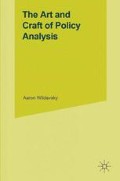Abstract
Why do we feel that public policy problems never seem to be solved? As knowledge and skill grow in society, why do efforts to control public policies lag behind their ability to surprise us? Why don’t organizations that promote public policies seem to learn from experience? If they do try, why do their actions lead to ever larger numbers of unanticipated consequences? One answer, I will argue, lies in the growing autonomy of the policy environment. Because policy is evermore its own cause, programs depend less on the external evironment than on events inside the sectors from which they come. The rich inner life of public agencies helps explain why there appears to be so much change for its own sake. If bureaucracies are the principal opponents of change, as is often alleged, however, how can they also be its chief sponsors? How, if major sectors of public policy can control their internal response to external events, does the world outside specifically affect organizational behavior in government? If external forces matter, why do organizational responses often appear to have so little relation to what actually goes on out there in society? Why, in a word, do supposed solutions turn into perplexing problems? Because the Law of Large Solutions in Public Policy —when the solution dwarfs the problem as a source of worry—is inexorable.
The foremost of all illusions is that anything can ever satisfy anybody. That illusion stands behind all that is unendurable in life and in front of all progress, and it is one of the most difficult things to overcome…
Only that which can destroy itself is truly alive.
Carl Jung
We forget the solution that generally comes to pass and is also favorable: we do not succeed in changing things according to our desire, but gradually our desire changes. The situation that we hope to change because it was intolerable becomes unimportant. We have not managed to surmount the obstacle, as we were absolutely determined to do, but life has taken us round it, led us past it, and then if we turn round to gaze at the remote past, we can barely catch sight of it, so imperceptible has it become.
Marcel Proust, Remembrance of Things Past: The Sweet Cheat Gone
Access this chapter
Tax calculation will be finalised at checkout
Purchases are for personal use only
Preview
Unable to display preview. Download preview PDF.
Notes
A. R. Prest and R. Turvey, “Cost-Benefit Analysis: A Survey,” Economic Journal Vol. 75 (December 1975), pp. 683–775.
Alex Radian, “Politics in Administration of the Taxing Process in Poor Countries,” (Ph.D. dissertation, University of California, Berkeley, June 1977 ).
Daniel P. Moynihan, The Politics of a Guaranteed Income: The Nixon Administration and the Family Assistance Plan (New York: Random House, 1973).
Hugh Heclo, “Frontiers of Social Policy in Europe and America,” Policy Sciences Vol. 6 (December 1975), pp. 404–405, 407, 411–413.
James March and Johan Olson, “The Uncertainty of the Past: Organizational Learning under Ambiguity,” European Journal of Political Research, Vol. 3 (1975), p. 153.
Ellen Polgar, “The California High School Proficiency Exam,” (mimeographed, Graduate School of Public Policy, University of California Berkeley, June 1976 ).
Philippe C. Schmitter, “Still the Century of Corporatism?” in F. B. Pike and T. Stritch, eds., The New Corporatism: Social Political Structures in the Iberian World (Notre Dame, Ind. and London: University of Notre Dame Press, 1974 ), pp. 93–94.
Harold L. Wilensky, The “New Corporatism,” Centralization, and the Welfare State(London and Beverly Hills: Sage Publications, 1976), p. 23.
Shirley Williams, Secretary of State for Prices and Consumer Protection, The Times (July 6, 1976), p. 18.
See Aaron Wildaysky, “The Self-Evaluating Organization,” Public Administration Review Vol. 32 (September-October 1972), pp. 509–520.
See Hugh Heclo and Aaron Wildaysky, The Private Government of Public Money: Community and Policy Inside British Political Administration (London: Macmillan; Berkeley, Los Angeles: University of California Press, 1974 ).
See Jonathan P. Sher and Rachel B. Tompkins, “Economy, Efficiency and Equality: The Myths of Rural School and District Consolidation” ( Washington, D.C.: National Institute of Education, July 1976 ).
See Aaron Wildaysky, Budgeting: A Comparative Theory of Budgetary Processes (Boston: Little, Brown, 1975 ).
See Arthur Stinchcombe, “Merton’s Theory of Social Structure,” in Lewis A. Coser, ed., The Idea of Social Structure (New York: Harcourt Brace Jovanovich, 1975 ).
Gudmund Hernes, “Structural Change in Social Processes,” American Journal of Sociology, Vol. 82, No. 3 (November 1976), p. 2.
Quoted in Karl E. Weick, The Social Psychology of Organizing ( Reading, Mass.: Addison-Wesley, 1969 ), p. 58.
See Karl Mannheim, Ideology and Utopia translated by Lewis Wirth and Edward Shils (New York: Harcourt Brace and World, 1959).
Martin Landau, “Federalism, Redundancy and System Reliability: The Federal Polity” in Publius Vol. 3, No. 2(1973), p. 188.
Peter B. Clark and James Q. Wilson, “Incentive Systems: A Theory of Organizations, Administrative Science Quarterly Vol. 6 (September, 1961 ), pp. 129–166.
Copyright information
© 1979 Aaron Wildavsky
About this chapter
Cite this chapter
Wildavsky, A. (1979). Policy as Its Own Cause. In: The Art and Craft of Policy Analysis. Palgrave Macmillan, London. https://doi.org/10.1007/978-1-349-04955-4_4
Download citation
DOI: https://doi.org/10.1007/978-1-349-04955-4_4
Publisher Name: Palgrave Macmillan, London
Print ISBN: 978-1-349-04957-8
Online ISBN: 978-1-349-04955-4
eBook Packages: Palgrave Political & Intern. Studies CollectionPolitical Science and International Studies (R0)

